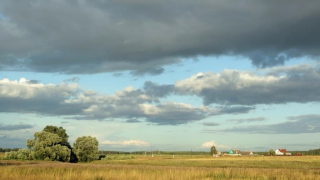Downfall and rebirth in Russia
The fall of the Soviet Union, as is widely known, was absolutely disastrous for Russia in terms of the loss of territories, and therefore disastrous for the Eurasian cause, since this cause is the creation and preservation of a civilization that is the antithesis of the Western one.
But it was also disastrous in the economic and social area in general. In 1990, the real Russian GDP fell by 3%, and in 1991 by another 5%. Between 1992 and 1996 the fall of the Russian GDP was stunning, by 43.5%: a catastrophe bigger than the great depression of 1929 in the USA.
According to data from October 1996, by that time there was a situation where approximately 44 million people out of a population of 148 million had fallen below the poverty line, defined at that time as living with less than 32 dollars per month. The Russian economy hit its low with the crisis of August 1998, in which Russia could not pay international debts, and where many banks collapsed, having a devaluation of the ruble of 75%, and a Russian government that as a result of the crisis entered bankruptcy, which among other things created a large increase in unemployment, especially among women.
The suicide rate in Russia doubled in the 1990s, and deaths caused by alcoholism, which can be considered in some cases as another form of suicide, tripled in that decade. Infant mortality reached third world levels in a country that was the Mecca of communism. Population’s high mortality due to the destruction of economic welfare and social security, added to the fall in the birth rates, caused population decrease inside the Russian Federation, as well as in other countries that made up the former Soviet Union.
The most dramatic case was that of Ukraine, which went from a population of 52 million people to a population of 45 million people in 2013, just before the Russian annexation of Crimea. Undoubtedly the fall of the Soviet Union was like Russian President Vladimir Putin said, the greatest geopolitical catastrophe of the 20th century, not only because of what this meant for the peoples that made up the Soviet Union, but because the disappearance of a large part of the international Russian power, which was based on economic and military might, and on the possession of a large list of territories being now lost by Russia, meant for many other peoples the loss of a counterweight to brutal capitalism and globalist policies.
The peoples of Ukraine and Belarus, as well as the peoples of Moldova and Georgia, are peoples where there are both Russian minorities and a Russian-like culture for the rest, and must be considered as essential territories for the defence of the current territory of the Russian Federation.
These peoples separated even though that meant becoming insignificant at the international level, both because of smaller territorial and economic scale in relation to the Soviet Union as a whole, and because of the economic destruction that brought the disintegration of the Soviet Union not only in the territory of the Russian Federation but in those countries, as well as by the wars that broke out in Georgia and Moldova immediately after the fall of the Soviet Union, and the other wars in Georgia and Ukraine in subsequent years.
In the case of the Baltic countries, while they are countries that in the course of history went in the opposite direction to Russia's wishes, and are now part of NATO, they mistakenly believe that being independent of Russia means being truly independent, as if living under the economic and cultural shadow of the globalizing capitalism of the West is to be independent.
Meanwhile, in former Soviet countries with large Muslim populations, there has been a resurgence of Islam with its consequent radicalism.
In other Muslim countries that did not belong to the Soviet Union, the intervention of NATO has created an enormous growth of the power of extremist Islamic movements.
In Afghanistan, the West's support for Islamic fanatics to defeat both secular Marxist government in Afghanistan and Soviet troops that came to Afghanistan allowed the proliferation of such things like al Qaeda.
In Iraq, Syria and Libya, the interventions of the West and Turkey have created total chaos by overthrowing governments that were authoritarian but maintained stability in those countries, and the result now is that these countries are a nest of terrorist groups and they have been devastated by war. In addition to that, millions of people from those countries decide to go in the hundreds of thousands overflowing Europe and creating a humanitarian crisis and tension throughout that continent.
Finishing the goal of building a mature Russian State in a Russian cultural space is absolutely needed today. A State that will not be part of an international network for cultural decline and financial interests, but an entity of the People.
Only by realizing the need for that is the way in which any decline of the Russian People can be ended once and for all, creating a strong basis on which the new State may someday exist in its mature stage. This is the first principle for Russia’s rebirth.
Not realizing that principle is why God did not allow the victory of the U.S.S.R in the Cold War, but its downfall.
The failure to see the inner problems meant all attempts at avoiding the collapse of the Soviet Empire were in vain. In that time, the internal enemy remained unrecognised.
Only a tiny fraction of the People’s potential remained as a result of the liberal paralysis inflicted in the Russian political system.
In 1991, the fall of the communist society didn’t gave the way to a strong People as inner strength disappeared.
The U.S, Vatican and NATO flags rose higher as inner strength and authentic will among the Russian People was suffering from a devastating illness. Both in the West as in Russian liberal circles, the enemies of mankind worked very hard throughout those years to destroy Russia and impose liberalism.
The only resistance to liberalism came from some traditional sectors of the Russian society and from competition between great and small oligarchs.
The ruling communist class itself had no idea it was infected with the illness of liberal ideas. This was not only because of Western actions, but mostly because the communist regents and the communist society already carried the seeds of liberal decadence within themselves.
The successes in ending the communist regime had catastrophic consequences. The growth of liberal votes at legislative elections foreshadowed the imminent internal and external collapse.
Despite all the restructuring that seemed to occur and promises of economic wealth, the general situation was turned into a tragedy. Anyone who has truly observed the Soviet Empire’s line of political development cannot help but realize that even when the Soviet peoples were under one flag and with rising international influence, its internal decay was already there. The Soviets then ignored the root cause of the fatal disease in their society.
No matter what they did, their efforts were condemned to fail because they only saw the symptoms of general decay and tried to fight those symptoms instead of the cause..
Of course not that all of those who politically doctored the Soviet State were bad or malicious by nature, but regardless of that it is necessary to establish a faith in an idealistic Russia to battle against the threat imposed by the present weaknesses of materialism.
When the Russian People abandoned their ancient ideals to follow the practical materialistic promises of the Revolution and exchanged the crucifix for a rifle, the Russian People found themselves not in a socialist paradise, but rather in a reality of unending hardships.
People did not die just over concern for their food, but for love of the Motherland, belief in its greatness, and patriotism.
If anyone can uphold higher ideals, is easy to remind him of a time when courage was the testimony to the strength of patriotic sentiments. Not in vain the Great Patriotic War is called as such. We must never fail to uphold truly strong ideals. Failures must not distract us from that goal, for we cannot abandon basic laws simply because some errors are made in their application, and we cannot condemn all advance just because there is still mistakes and hardships in spite of the best efforts.
For that reason, individuals and society as a whole must do the best they can and try to approach the authentic will of a People. Harsh reality will always limit what we seek to reach. But that does not imply the abandonment of the People’s duty to fight against the faults they see, to overcome weaknesses among themselves, and to strive for their beliefs.
People is not so naive as to believe that society perfect for earthly existence can ever happen as promised by communism.
Achieving this perfect society is a premise that this world, including the Russian People, could never put in practice and therefore would never be outside the realm of human imagination. The best we can make is a wisely constructed civilization that will allow every honest man a decent existence as both and individual and a member of the People.
The reconstruction of Russian international power, which must take place by means of growth and economic well-being, population growth, the increase of Russian military power, and territorial expansion, is a fundamental task for the Russians.
But it is also important for all the peoples of the world, since Russia, with its enormous amount of natural resources, its human resources, and its military might, is an elemental bastion from which liberal universalism can be fought.
The difference between what we should call Russian patriotism and Russian nationalism is that Russian nationalism is based exclusively on the people who are ethnically Russian, while Russian patriotism defends the interests of ethnic groups living within the current borders of Russia, and within the old borders of what was the old Russian Empire and the Soviet Union.
Russian patriotism, to be effective, must be differentiated from nationalism, defending not only the interests of the Russian ethnicity but the interests of other ethnic groups living inside and outside the current borders of the Russian Federation, maintaining People’s unity and establishing alliances with several countries of the world. This alliance has as its result not only to strengthening of Russia, but also establishing from Russia a counter-hegemony pillar that allows humanity to fight against liberal universalism as well as other universalisms, and to help other pillars in other regions to do the same.
The Belovezha Accords of December 8, 1991, together with the subsequent Alma-Ata protocol, which put an end to the Soviet Union, must be considered as illegal and without any validity.
The creation of a confederate entity, that is the Commonwealth of Independent States, instead of the renewal of the federal structure of the Soviet Union, directly violated the will of the voters who in the referendum of March 17, 1991 voted for the permanence of a federal structure.
The President of the USSR Mikhail Gorbachev and all the other participants in the meetings of Novo-Ogaryovo, consciously violated the fundamental constitutional norms of the USSR.
The law of the USSR of 27.12.1990 No. 1869-1 "Regarding national vote" (and therefore the referendum of the USSR) had an
explicit provision in the mandatory nature of the decision of the referendum for all the republics of the Soviet Union, including the six republics of the Soviet Union that did not participate in the referendum of March 17, 1991.
The Belovezha Accords were also illegal because the decision of only 3 republics (Belarus, Ukraine and Russia) could not decide the fate of all the republics of the Soviet Union, this was allowed only to be done by the will of all the republics, and this will could only be called by a referendum such as that of March 17, 1991, or by convening the Congress of People's Deputies of the Soviet Union. This also makes illegal the later Alma-Ata protocol of December 21, 1991.
The ratification of the Belovezha Accords, made on December 12, 1991, was carried over by a public authority without the authorization to do so (the supreme Soviet of the Russian Soviet Federative Socialist Republic).
Once the Belovezha Accords and the Alma-Ata protocol are declared illegal and without any validity, the current status of the government of the Russian Federation as the successor state of the USSR should be retained because this state concentrates the majority of the population and resources among the republics that belonged to the USSR, in addition to having a large number of nuclear weapons.
As the next step, Ukraine, Belarus, Moldova, and the entire territory of the former Soviet socialist republic of Georgia must be annexed by Russia, due to its cultural proximity to Russia in comparison to the other former republics with large Muslim populations, as well as due to its importance for the security of the Russian Federation and the ethnically Russian people living in those territories, to which we must add the combined resources of all those regions, including human resources.
The strength of a Russian state of less than 150 million people would be seen in the eyes of the world as smaller than the strength
of a state of more than 200 million people. Once the regions are reincorporated, a referendum will be held for the entire territory of Russia, including the reincorporated territories, to ratify the annexation.
The independence of the other post-soviet states must be recognized by Russia in the framework of a new legal treaty, which also stipulates the continuity of the economic, political and military ties with these former Soviet republics.
The annexed countries should not be granted autonomy within the great union, invoking national security as a reason for this and considering the annexed countries as the result of an illegitimate process and therefore not recognizing their existence.
As for other states, the difference between Russia's cooperation with governments such as Syria and India, and Russia's cooperation with China and Iran, is that Russia endorse the doctrine of the first two governments, which besides being based on close collaboration with Russia, is based on the rejection of Islamic extremism, and in the case of Syria, despite having a secular government, the Baath party led by A1 Assad is dominated by the Alawites, a group with a religion which, as we shall see, is compatible with true Christianity.
Meanwhile, Russia does not defend the ideological position of Iran, which is based on Islamic universalism, or the ideological position of China, similar to fascism and clearly expansionist. Russia's cooperation with China and Iran only has a strategic purpose but it has no ideological purpose, so Russia is not an ally of China and Iran. The word "partners" should be used to refer to those countries that only establish ties for some specific purposes but do not defend the other's ideological position and therefore are not truly allies, since a partner is only the enemy of your enemy, but not a friend, as in the case of Iran, while an ally is like a friend that can be trusted within the framework of an ideological agenda.
For example, during World War II, the Soviet Union was not an ally of the US and England, they were just partners, and this became very clear once the cold war began.










